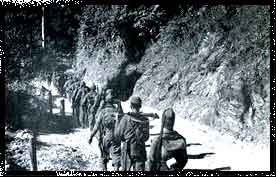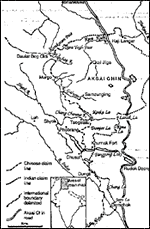Home > News > Specials
The Rediff Special/Mohan Guruswamy
June 23, 2003
Part I: The Great India-China Game
Part II: The battle for the border


The Dalai Lama's flight to India was followed by two ominous incidents. On August 25, 1959, Indian and Chinese forces clashed over the possession of Longju, a small village in the eastern sector. We said it was on the McMahon line and, therefore, ours, the Chinese said it was two miles north of it and, therefore, theirs. There were a few casualties on both sides. On October 20 the same year, the Chinese ambushed an Indian patrol sent to probe the Aksai Chin at Kongka La, in which nine Indian frontier policemen were killed and seven were taken prisoner. With this, public opinion in India was inflamed. A democracy is nothing but a government sensitive to public opinion and governments that ignore this do so at theirs own peril. But public opinion, even when not inflamed, is quite often ill informed. Even among the leadership, many never really understood the historical background of the dispute.
We claimed what the Chinese were claiming and occupying was our 'sacred land' and this was accepted by almost all, except the doctrinaire Marxist Communists who may have done this for reasons not related to history. The Indian government knew better, but allowed itself to be swept by the tide of public opinion and, true to the manner the great game of democracy is played here, the opposition did nothing to bail it out.
The influence of the domestic imperative in the international politics of democratic countries must never be underestimated. It is also an inherent characteristic of democratic societies that very little flexibility is given to the decision-makers in choosing a policy from a wide spectrum of options. If for instance, Nehru accepted Chou En Lai's offers of a settlement on a give and take basis, he would have been accused of giving up our 'sacred' territory. As it is, the opposition was exploiting Nehru's discomfiture over his failed China policy and his naïve reliance on Hindi-Chini bhai-bhai and the Panchsheel policy with the world's foremost practitioners of realpolitik.
In the highly partisan atmosphere that characterised our politics then, as it is even now, any stick is good enough for the opposition to beat the government with and vice versa. The opposition, though small in number then, made up for lack of quantity with quality. Eminent leaders like Ram Manohar Lohia, Acharya Kripalani, Asoka Mehta, Deen Dayal Upadhyaya, Minoo Masani and C Rajagopalachari, known for their incisive intellect and oratorical abilities and smarting at their electoral inconsequence, tore into the government in Parliament and outside. Others like Atal Bihari Vajpayee, who is now the prime minister of India, were well known for their fiery demagoguery.
Many of Nehru's colleagues, upset by his 'loftiness' and his fondness for Krishna Menon, often preferred to be bemused observers enjoying these blistering attacks. China was treated as Nehru's problem. To be fair to them, Nehru had for long kept the problems with China to himself as he did with most matters pertaining to external relations. To get over this uncomfortable 'debating' situation in Parliament, Nehru often had to sound tough and uncompromising. This would have been fine, if he had the military strength to back him up. Unfortunately for the country, this was not so.
 The Indian Army then was poorly equipped, short-staffed and generally in a bad way. Krishna Menon as defence minister squabbled with the generals in public and wrought havoc with the morale of the military's top brass. Aiding him in good measure was a Nehru kinsman, Lieutenant General B M Kaul, a soldier with no combat experience. In his bid to be one up over his peers, he would agree to do things the politicians wanted done, but the general staff baulked at.
The Indian Army then was poorly equipped, short-staffed and generally in a bad way. Krishna Menon as defence minister squabbled with the generals in public and wrought havoc with the morale of the military's top brass. Aiding him in good measure was a Nehru kinsman, Lieutenant General B M Kaul, a soldier with no combat experience. In his bid to be one up over his peers, he would agree to do things the politicians wanted done, but the general staff baulked at.
The press in those troubled days was not very helpful either. The major English language papers shrilly, and almost in unison, demanded the Chinese be expelled and often accused the government of not doing its duty. The influential English language media, with few notable exceptions, were still conditioned by their pro-British past. They were generally pro-West and found this a good opportunity to needle the government on its policy of non-alignment, seen by them in Dullesian terms as being pro-Soviet. The editors and pundits, never comfortable with Nehru's non-alignment, went hammer and tongs at him. Given this atmosphere, partisan political interests took precedence over national interests. This is not unfamiliar even today. The need to develop a non-partisan national consensus based on a rational survey of facts and events never was greater, yet was as far as it often seems even now.
Against this surcharged backdrop, Nehru had to come up with something. This something was the Forward Policy. This policy called for establishing posts in the disputed areas often behind the Chinese line of forward posts. Thus a number of small forward posts were set up with meagre resources, poor communications and extremely vulnerable supply lines. Most of these posts had to be supplied by air drops and quite a bit of the supply would end up in Chinese hands. The Chinese People's Liberation Army would then hand them over to our men to derive a psychological advantage.
Nothing describes the Forward Policy better than the words of an Indian Army officer: 'We thought it was a sort of game. They would stick up a post and we would stick up a post and we did not think it would come to much more.' It came to be much more, as it had to, and the consequences were felt in 1962 when a full-scale border war broke out. The Forward Policy was against all sound military advice.
Lieutenant General Daulat Singh, GOC, Northern Command, bitterly criticised this policy in his memo to the government on August 17, 1962. He wrote: 'It is imperative that political direction is based on military means.' Singh's warning, like those of many other senior officers, was ignored. Then defence minister Krishna Menon, Intelligence Bureau director B N Mullick and Lieutenant General B M Kaul, who had conjured up this policy, had Nehru's ear and that was what mattered. If Nehru had learnt a little from the much-publicised Bay of Pigs fiasco the new American administration of then President John Kennedy had landed itself into in 1961, he would have been very wary of this threesome.
In Kennedy's case, he allowed the legendary Richard Bissell, the Central Intelligence Agency's then director of operations, to awe him, his cabinet and his military chiefs into approving an operation that was based on little hard intelligence and a lot of wishful thinking. Also, in Kennedy's case, the pressures of the domestic imperative were overwhelming. The planning of the operation had begun in Eisenhower's time with Richard Nixon playing a leading part in it. If Kennedy aborted the plan, he would have been accused of being 'soft on communists' and what greater crime can there be in that bastion of 'freedom and liberty' than this? He succumbed to the fear of an inflammable public opinion just as Nehru was to do later. In both cases, the policies ended up as unmitigated disasters that almost irretrievably hardened positions and thus shaped the future course of national direction and domestic politics.
Incidentally, the order to 'throw the Chinese out,' was given on September 22, 1962 by K Raghuramiah, then minister of state in the defence ministry. Raghuramiah was in the chair, Krishna Menon being in New York to deliver yet one more of those long harangues he was so fond of, when then army chief General K N Thapar gave his appreciation of the situation in the Dhola area. The then foreign secretary then gave his appreciation that the Chinese were unlikely to react strongly and, for good measure, repeated the prime minister's 'instructions' on the subject. We went to war!
In the 41 years that have followed the debacle of 1962, little has changed. We in India have not yet been able to get together a non-partisan consensus on crucial issues such as this. We do not seem to have as yet grasped the real and futile nature of the border dispute. In an overpopulated, overcrowded and primarily agricultural country with a relatively small landmass to share, the concern and obsession with land is understandable. Land is our primary economic resource and hence it is an ingrained national characteristic to be possessive about it. Our leaders, notorious for their land grabbing ways, have not surprisingly acquired an estate agent's mentality as far as territory goes. It seems that, to us, our country no longer means people but land. Why would we care so little about our people and their interests and honour and care so much for an inhabitable desert?
While it is possible for us to settle our eastern border disputes with China on the basis of a clearly demarcated McMahon line, there seems little or no chance that the Chinese could be persuaded to hand over Aksai Chin to us, thereby de-linking Tibet from Sinkiang. There also seems an equally remote chance that we might be able to retrieve it from the Chinese by military means. Even if we summon the political will to stake a fortune, the sheer lack of any tangible benefits, material or spiritual, will only make this even more foolhardy.
There are many indications that the Chinese would settle along these lines. We in India still seem prisoners of our past and continue to take an excessively legalistic view of past events and present inheritances. We have even bound ourselves in knots with a jingoistic and unrealistic parliamentary resolution that binds us to an undefined boundary bequeathed to us and to the 'liberation' of occupied territory, so desolate and inhospitable that let alone animal life, even plant life is hard pressed to exist upon it! By freeing ourselves from this mindset, we could meaningfully negotiate a settlement with the Chinese, whose only aim in this sector seems to secure the Sinkiang-Tibet highway through the Aksai Chin. While this will not entirely dissipate the rivalry between the two countries, it will remove a cause of frequent tension that only serves to underline our unfavourable strategic position.
The challenge now for our national leadership is to harmonise reality with sentiment, pragmatism with unhistorical belief and national aspirations with imperialistic legacies. To be able to do this we first need to extricate such sensitive and critical issues from the ambit of partisan politics. The responsibility for this lies with the government of the day, which alone can orchestrate such an exercise. By doing this, we can once again bring into alignment our political objectives, with military means and reality. We can then negotiate from a position of strength and give ourselves secure, defensible and natural boundaries in the north at least. And who knows this may even lead to lasting good relations between the two great countries.
Part I: The Great India-China Game
Part II: The battle for the border
Image: Lynette Menezes